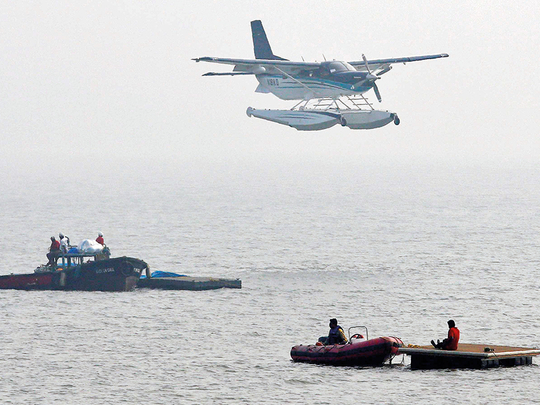
Mumbai: SpiceJet airline conducted its first commercial seaplane trials near Marine Drive as part of its goal in providing air connectivity to the remotest parts of the country.
SpiceJet and Japan’s Setouchi Holdings have been working closely for over six months to explore opportunities for small 10 and 14-seater amphibious and land plane operations to provide air connectivity to smaller towns and cities which have hitherto remained unconnected due to infrastructural challenges.
This was the second phase of trials for the amphibious aircraft. Under the first phase, trials of the land plane were conducted in Nagpur and Guwahati.
The seaplane trials were conducted today in the presence of Nitin Gadkari, Minister of Road Transport & Ganga Rejuvenation, Ashok Gajapathi Raju, Minister of Civil Aviation and senior government and aviation officials. SpiceJet is the only Indian airline to explore air connectivity through water bodies such as rivers or inland waterways.
Uttar Pradesh, Rajasthan, Maharashtra, regions in the North East, Andamans, Lakshadweep and other coastal areas are a few destinations that are being evaluated for amphibious plane operations.
Ajay Singh, CMD, SpiceJet said, “We see tremendous potential in our smaller cities and we feel it is our duty as an Indian carrier to bring these smaller towns on the country’s aviation map. Being the largest regional airline in the country and a trendsetter of the Regional Connectivity Scheme — UDAN, SpiceJet will continue to add new wings and give a boost to regional economies.”
He said, “Seaplane operations can bring the remotest parts of India into the mainstream aviation network without the high cost of building airports and runways. While we are one of the fastest growing aviation markets in the world, we need to ensure equitable and inclusive air connectivity within the country. Our seaplane service will open a whole new market for the both the airline and tourism industry and will revolutionise the regional connectivity scheme.”
Lauding Spicejet’s efforts, Kazuyuki Okada, President & CEO, Setouchi Holdings Inc., said, “With the ability to land in a small or confined space, Kodiaks are the perfect flying machines that effectively connect the country’s remote cities and airstrips, which in turn revolutionise the regional connectivity scheme.”
The Japanese company is a pioneer in the small aircraft aviation industry and owns Quest, the manufacturer of amphibious and non-amphibious range of aircraft globally. There are about 200 Kodiak Quest aircraft flying all over the world for past 10 years. Amphibious planes are said to be reliable and tough since smaller fixed wing aircraft can land on water bodies, gravel and grass.












